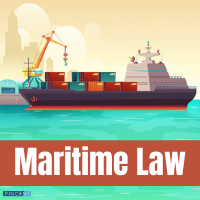
Table of Contents
Maritime Law
What is Maritime Law?
Maritime law is a body of legal rules and regulations governing ships and shipping. It is also called admiralty law or admiralty. In countries where English is the main language, admiralty is often used in synonyms to the jurisdiction and procedural laws of the courts. The origin of these courts may be traced to the office of admiral. Although maritime law and law of the sea are identical, the former is a term that is applied to private shipping law. Maritime law includes regulations registration, inspection procedures for ships, maritime insurance, and carriage of goods and passengers.

The convention on the law of the sea, is a UN agreement regarding sea lanes, territorial waters and resources of the ocean. The convention was signed by 119 nations on December 10, 1982. Remember the conventions are amended regularly to keep up with technology and new business practices.
Inter-Governmental Maritime Consultative Organisation (IMO)
IMO is held responsible for upholding the existing international Maritime conventions, uphold the new agreements that develop and arise as and when they are needed.
The IMO three conventions which are the most important are mentioned below:
- The International Convention for the Safety of Life at Sea
- The International Convention for the Prevention of Pollution from Ships
- The International Convention on Standards of Training, Certification, and Watchkeeping for Seafarers
IMO has 174 member states who are responsible for implementing these conventions for ships registered in their country. The local governments regulate the above-mentioned provisions for ships. Additionally, they also impose penalties for wrongdoings and other illegal activities. For instance, many times ships miscarry certificates. To avoid such activities, they are inspected to meet the required standards as set out by the local governments.
Talk to our investment specialist
Important Points about Maritime Law
The registration country, where the ship is registered, would determine a ship's nationality. Ideally, the national registry is the country where the owners live and operate their business. Most of the shipowners will often register their ships in countries that allow foreign registration. Two of the popular examples for such countries are Panama and Bermuda.
All efforts have been made to ensure the information provided here is accurate. However, no guarantees are made regarding correctness of data. Please verify with scheme information document before making any investment.












